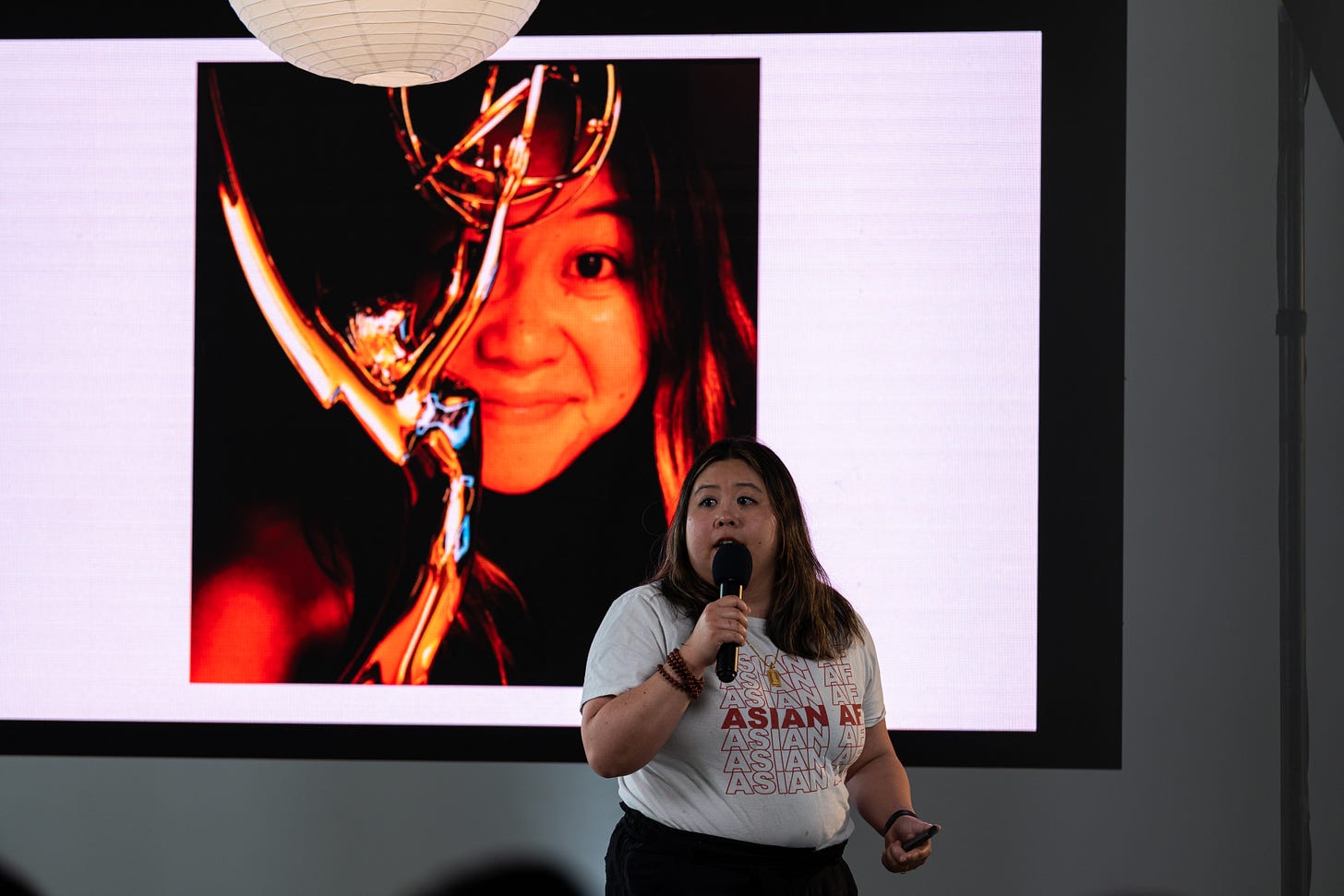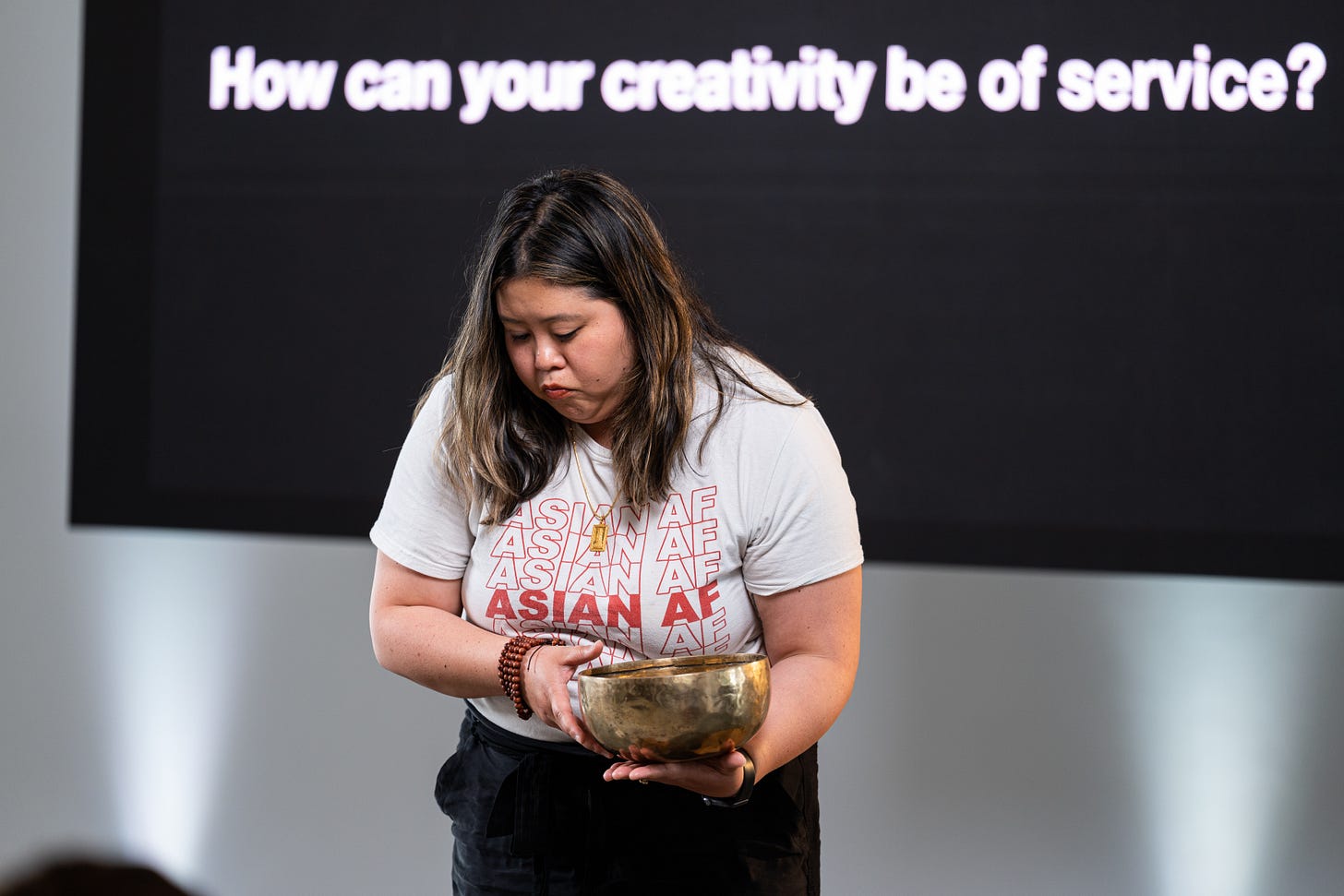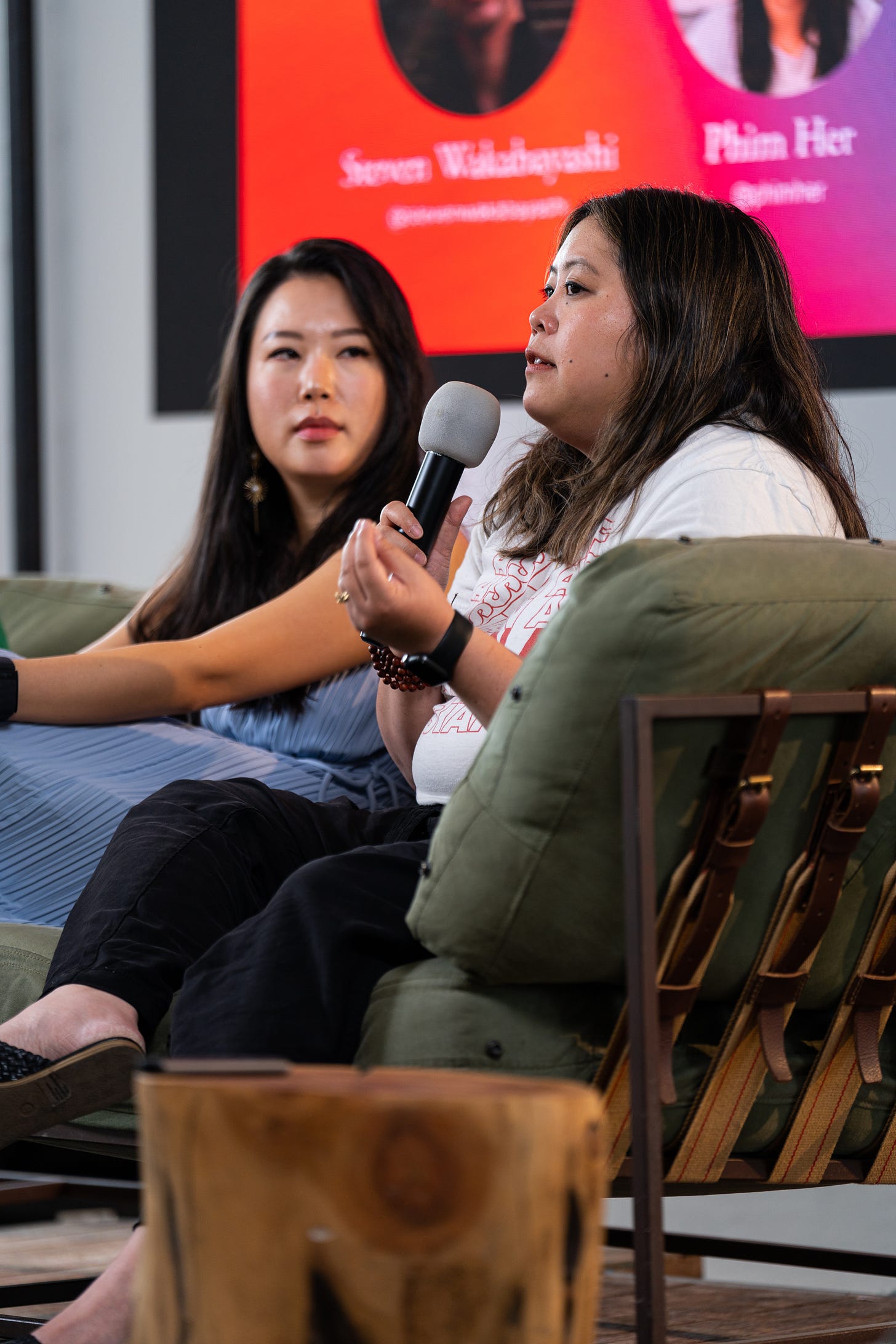A Letter to API folks: You are Worth It
And a reminder to all: How can your work be of service to the world?

Weekly Contemplations
How can my work be of service to the world?
How can my work decrease the suffering of others?
***
As I continue to reflect on the joyous moments where I have centered my AAPI identify, I want to uplift being a part of the Asian Creative Festival (ACF) last year. ACF brings together AAPI creative organizations, industry leaders, and seasoned creators to network, share knowledge, and foster collaborative projects. I was fortunate enough to be invited to a lot of events for AAPI/mental health awareness month last year, but this felt different because it was hosted by our community.
Myself, my dear friend Steven Wakabayashi, Phim Her, and Sally Chung all shared our journeys on how spirituality impacted our professional journey as creatives. Below is my talk I did that I hope you will take time to read (or you can scroll to the bottom and watch).
I truly believe that we can all be of service with what we do and that is my invitation to you all today with sharing this piece.
A Letter to API folks: You are Worth It
I’m here today to remind you that you have a purpose in this life. Whether or not you know it.
I’m a meditation and mindfulness teacher but trust me when I say I’m definitely not an expert, or a guru. Just writing to you today as your spiritual friend. I am hoping that sharing my own story, in this moment, human to human, will help you see your fullest potential.
We need you. The world needs you.
If you’re like me, you probably have loving but slightly overbearing parents who went through tremendous things so you could have the life you have today.
That is my story.
My parents are Vietnam War refugees.
My sister was born four days before the Fall of Saigon when the American military decided to finally let go of their efforts of defending democracy against a Communist takeover. My father, like many men in Vietnam, was captured and imprisoned in a VietCong re-education camp. While he endured inhumane conditions, my mother spent 2.5 years searching for him, while raising my then newborn sister. Through sheer perseverance, resilience, and unwavering love, she found him and rescued him. Like hundreds of others, they escaped Vietnam in a fishing boat in the middle of the night and started to pursue the American Dream.
Eleven years later, I arrived in Houston Texas — like Beyoncé. I grew up loosely Buddhist in a predominantly white suburb, often finding myself to be the only person of color and most of the time, the only Asian person in the room.
I didn’t have the language that I have today to understand I was being pushed to the margins — that I was the other. All I knew was that I didn’t belong. And that perhaps my parents’ American Dream was further out of reach than any of us realized.
I spent the first 20 or so years of my life trying to do everything I could to fit in, to make myself into something I wasn’t. I was moving further and further away from myself. I sacrificed parts of me, parts of my Asianness, succumbing to assimilation, getting lost in the folds of internalized racism with the hope that I would one day feel a sense of belonging.
Storytelling became my refuge. I wrote, to express myself in ways that I could never say out loud, I wrote with the hope that my words could make me feel enough in a world determined to make me feel small.
I was lucky enough to land gigs telling other people’s stories at some big places — the Associated Press, FORTUNE magazine, MTV and Discovery, among others.
I raced towards the idea that once I got to the top of the corporate ladder, I would finally find myself. That I would finally believe that my voice mattered, that I belonged.
I found myself with a fancy title, a fancy paycheck and fancy awards, praying, hoping that it would lead me to happiness, to joy, to peace.
I thought that once I got all these things that it would justify all the sacrifices my parents made, all the pain and suffering they endured for me to have a better life, to have that American Dream.
The thing was, I was so busy telling other people’s stories that I didn’t even know my own. I didn’t know what it meant to be Asian, to be a woman, to be Queer — much less to be all those things all at once.
I was lost more than ever.
I was experiencing what’s called arrival fallacy — this idea that you work incredibly hard towards a goal, an idea, really anything and then once you get there, it’s not at all what you thought it would be.
I was left asking myself: Who was I? How did I get here? How could I have anything to say, to give when all I felt was emptiness?
Since then, I have been laid off. Not once, but twice. After I got over the blows to my ego, I realized that the Universe was doing me a service, steering me not just more towards my path, but more towards myself.
It wasn’t until I sat with myself for hours and hours, sitting in stillness and quiet that I could finally see who I was and embrace all the parts of me. It is when the ache to belong softened, when I started to entertain the possibility that perhaps I was in fact enough.
That’s why I share the practices and tools of meditation, yoga, and mindfulness. Because it helped me find my voice, my worth. To relax more into the fullness of my being.
I knew I wasn’t alone in my own experience.
That’s why I created Joyful Liberation Collective — a non-profit that shares these teachings, these practices to underserved and marginalized communities. It has become my life’s work to empower people of color, queer folks — anyone who has been made to believe that they were less than or didn’t belong.
It is through this work, I came back to my roots of Buddhism and started becoming a student of the dharma. When I started studying from teachers like Thich Nhat Hanh who share my ancestry. It is my hope that with this work I can help people understand that the narratives we have been told about ourselves are not just untrue, but have been intentionally created to make us work endlessly into the ground towards a perfectionist ideal that simply cannot be obtained because it is a construct formed by those who want to be in power.
One of the core teachings of Buddhism is the deep understanding that we are not alone in our experience.
Literally, there is another sentient being touching the same state you are experiencing in this moment because we are all connected. Interconnected. Thich Nhat Hanh says we inter-are.
It is the understanding that we all need each other, despite what Capitalism, white supremacy, the patriarchy or those governing our country might have you believe.
One of the purposes of this view, of this perspective is to become awake to the world around us.
To embody this idea of Bodhicitta — to awaken the mind, to wake up to the world around us, to move through it consciously with deep compassion and understanding for all beings.
And a Bodhisattva is someone who dedicated their life to be of service.
So how does this relate back to my story? To you?
When I started to look at my work through the lens of how I could be of service to others, my imposter syndrome got a little quieter. I suddenly believed that my story, my insight, had a greater purpose than I could possibly understand. It was no longer for me, but for all of us, with the deep hope and intention that we would be kinder and more loving to ourselves and therefore, by kinder and more loving to everyone around us.
And somewhere between studying at an ashram in northern India and bowing my head at one of the Plum Village monasteries, I knew I was doing it for anyone who might have felt or is currently feeling alone in their experience. Like I did, when I was little.
I was doing this work, sharing my story, for anyone who wanted to be seen and heard, who was lost in the many intersections of their identity, who is tired of fighting for your existence in a world that targets you, demonizes you, suffocates you. This is the reason why I share my story of identity and healing so that you can feel less alone in your experience — no matter what identities you hold.
That is my invitation for you today:
How can you be of service to the world?
And if this question is bringing up confusion, excitement, anxiety, frustration, anger, joy — whatever it may be— I welcome that and invite you to welcome all of it too.
Because all of it is you. All of it is wisdom.
And if you cannot even fathom this idea that you could be useful, helpful, to anyone around you, I implore you to dig deep within yourself and recognize that you and your spirit have something to contribute to this world. Despite what you’ve been told, despite what you might believe.
Ask yourself: What is getting in the way? How can you let go of the obstacles between you and your purpose? How can you move around them? Circumvent them? Move closer and closer to the pure essence that is you? And only you?
How can you tap into the unique superpower that only you possess and can share with the world? How can you tap into your bodhicitta? What is your path as a Bodhisattva?
These are the questions of a lifetime, these are the questions that I hope you will start answering because you believe they are worth answering. Because you are worth it. And that deep down inside, you know that answer.
And if you do not know where to start, if these questions feel monumental, larger than you can comprehend or hold, yeah, that sounds about right. But one place you can start is with your breath.
These tools and practices have served our ancestors for centuries. It is part of blood, our lineage. It is a part of you. And if it can be of benefit, if it can help you see yourself with more truth and compassion, to understand that you do in fact belong, that you simply being yourself is your biggest superpower you possess, then why the fuck not right?
So let us sit and practice together, with our ancestors, with our community and with ourselves.
I offer this contemplation with anticipation and excitement to see what you will do and how it will change me and everyone here in this room.
So I wish you luck in your journeys. I wish you compassion, peace, and joy in your discoveries and I wish you patience in your confusion, with the understanding that confusion is also wisdom.
But don’t forget to buckle up, it’s gonna be a wild ride.






